A great Chicken Marinade makes all the difference. I add soy sauce, lemon, vinegar, garlic, and herbs to this recipe to make it taste great and keep the chicken soft and juicy. This marinade comes together in minutes and is the perfect addition to turn your chicken from bland to brilliant.
Chicken is one of the most popular protein meats, and in my kitchen, we enjoy it several times a week. I love how lean and versatile it is, making it easy to include in a variety of recipes. Some of our family favorites are my flavorful chicken fried rice and the classic, comforting chicken Francese.
A chicken marinade is a liquid blend of herbs, spices, oil, and other ingredients that naturally season and tenderize the meat as it soaks, whether for a short time or an extended period. There are many variations of chicken marinades, and the ingredients depend on the desired flavor profile.
I’ve always believed that a great chicken marinade should do two things: add flavor and lock in moisture. This one does both. A well-balanced marinade makes every bite of chicken juicy and delicious. That’s where I begin: with acids like vinegar and lemon. Next, I add salt from soy sauce or by itself. A binder like mustard helps the oil blend smoothly with the vinegar so the marinade coats the chicken evenly. Fresh or dried herbs, spices, and even a splash of wine can be added to change the flavors and bring everything together.
I use this recipe for grilling, roasting, or pan-searing, and it always creates the juiciest, most flavorful chicken. It’s versatile enough to work with pork, beef, and even vegetables.
Anyone else ever look at raw chicken in vinegar and wonder, “Am I making culinary magic or a disaster?” I’ve done that more often than I’d like to admit! Marinating chicken in vinegar is like walking a tightrope—if you stay on it for too long, the chicken will turn into mush, but if you jump off too soon, you’ll miss out on all the great tangy flavor.
After testing countless marinades (and yes, suffering through some regrettably rubbery chicken), I’ve finally nailed down the perfect timing for vinegar marinades. Let me share what I’ve learned so you can avoid my mistakes!
The Short Answer: How Long Should You Marinate?
For those in a hurry here’s the quick answer
The ideal marinating time for chicken in vinegar is generally between 30 minutes and 2 hours, depending on the vinegar type and chicken cut.
But there’s more to it than just setting a timer! Let’s break it down by vinegar type:
| Vinegar Type | Recommended Marinating Time |
|---|---|
| White Vinegar | 30 minutes – 1 hour max |
| Apple Cider Vinegar | 1 – 2 hours |
| Balsamic Vinegar | Up to 2 hours |
| Rice Vinegar | Up to 2.5 hours |
| Red Wine Vinegar | 2 – 4 hours |
Why Vinegar Works as a Marinade (And Why It Can Go Wrong)
We should first talk about why vinegar is such a great marinade before going any further.
Vinegar has acetic acid in it, which naturally softens meat. The protein structures in the chicken are broken down, which makes the chicken more tender and helps the flavors go deeper. That’s the good news!.
The bad news? Leave it too long and that same acid will continue breaking down proteins until your chicken becomes an unappetizing, mushy mess The science is pretty straightforward – what starts as tenderizing can quickly turn into over-processing
Different Types of Vinegar and Their Impact
Not all vinegars are created equal! The acidity level varies significantly between types, which directly affects how long you can safely marinate:
White Vinegar
This is the most acidic option (usually 5-8% acetic acid) and works FAST. I once left chicken in white vinegar for 3 hours and ended up with something resembling chicken-flavored jelly. Not appetizing!
Apple Cider Vinegar
With a milder acidity (around 5-6%) and slight sweetness, ACV gives you a bit more wiggle room. Its fruity undertones make it my go-to for everyday marinades.
Balsamic Vinegar
Less acidic than white vinegar but packing intense flavor, balsamic adds a rich, sweet-tangy profile. Warning: it will darken your chicken quickly, so keep an eye on it!
Rice Vinegar
The gentle giant of vinegars with just 4-5% acidity. Adding more time to the marinating process is possible, but even this mild choice has its limits.
Red Wine Vinegar
Similar to apple cider vinegar in acidity but with a more robust flavor profile. Great for Mediterranean-inspired dishes!
Factors That Affect Marinating Time
It’s not just about the vinegar type! Several other factors influence how long you should marinate:
1. Chicken Cut Size and Type
- Whole Chicken: The larger the piece, the longer it takes for marinade to penetrate. A whole chicken could theoretically marinate longer, but I still wouldn’t exceed 2 hours with vinegar.
- Bone-in Pieces: Chicken thighs, drumsticks, wings can handle slightly longer marinating times.
- Boneless Breasts: These are more delicate and can over-marinate quickly.
- Cubed/Thin Cuts: Small pieces expose more surface area to acid, so reduce marinating time.
2. Additional Marinade Ingredients
When you add oil, herbs, spices, or sweeteners to your vinegar marinade, they can help buffer the acidity. For example:
- Adding olive oil creates a barrier that slows acid penetration
- Sugar or honey can help balance acidity and prevent over-tenderization
3. Temperature
Always, ALWAYS marinate in the refrigerator! Room temperature speeds up the acid’s reaction dramatically, potentially ruining your chicken in half the time.
Signs You’ve Over-Marinated Your Chicken
How do you know if you’ve gone too far? Watch for these warning signs:
- Texture changes: The chicken feels unusually soft or mushy when raw
- Color: Appears paler than normal or has an odd translucent quality
- Surface breakdown: The meat starts to look “cooked” on the surface due to acid denaturation
If you see these signs, all is not lost! Rinse the chicken thoroughly under cold water, pat dry, and cook immediately. It might not be perfect, but it should still be edible.
My Favorite Vinegar Marinade Recipe
I’ve experimented with dozens of vinegar marinades, and this one consistently delivers amazing results:
Balanced Vinegar Marinade for Chicken
- 1/3 cup apple cider vinegar
- 1/4 cup olive oil
- 2 tablespoons soy sauce
- 3 cloves garlic, finely grated
- 1 tablespoon honey
- 1 teaspoon Dijon mustard
- 1 teaspoon fresh thyme leaves
- 1/2 teaspoon black pepper
- 1/2 teaspoon salt
- Whisk all ingredients together until well-blended
- Pour over 1-2 pounds of chicken
- Marinate for 1-2 hours in the refrigerator
- Remove chicken, pat dry, and cook as desired
The oil and honey help balance the vinegar’s acidity, while the mustard acts as an emulsifier to keep everything blended nicely.
Tips for Perfect Vinegar-Marinated Chicken
After many trials (and some embarrassing errors), here are my top tips:
- Use a non-reactive container – glass or plastic containers or resealable bags are best. Metal can react with acid.
- Always refrigerate while marinating – this slows down the acid reaction and prevents bacterial growth.
- Never reuse marinade that has touched raw chicken without thoroughly boiling it first.
- Pat chicken dry before cooking to promote better browning.
- Reserve some marinade before adding chicken if you want to use it as a basting sauce later.
- When in doubt, go shorter – you can always add more flavor with a sauce after cooking, but you can’t fix over-marinated meat!
FAQ: Everything Else You Need to Know
Can I marinate chicken in vinegar overnight?
No, please don’t! Even with the mildest vinegar, overnight marinating (8+ hours) will likely result in mushy, unpleasant chicken. If you need to prep ahead, mix your marinade and keep it separate, then combine with chicken 1-2 hours before cooking.
What happens if I marinate chicken in vinegar too long?
The acid continues breaking down proteins, resulting in mushy texture, potentially rubbery chicken when cooked, and overwhelmingly sour flavor. The chicken might also appear “pre-cooked” on the surface due to protein denaturation.
Can I freeze chicken in a vinegar marinade?
Yes, but with caution. The freezing process slows down (but doesn’t completely stop) the marinade’s effects. When you thaw the chicken, the marinating process will continue, so factor this into your timing. I recommend freezing chicken separately from acidic marinades when possible.
How do I know when vinegar-marinated chicken is done cooking?
Always use a meat thermometer! Vinegar-marinated chicken can sometimes appear more “done” on the outside due to the acid’s effects, but the internal temperature should still reach 165°F (74°C) for food safety.
Can I use a vacuum sealer to marinate chicken faster?
Yes! Vacuum sealing can significantly speed up marinating time by forcing the marinade deeper into the meat. If using this method, cut your marinating time in half to avoid over-processing.
The Bottom Line
Marinating chicken in vinegar is a balancing act that rewards patience and attention. Too short, and you miss out on flavor development; too long, and you’re ordering pizza because dinner is ruined.
The next time you’re planning a vinegar marinade, remember these timeframes:
- White vinegar: 30 minutes – 1 hour max
- Apple cider vinegar: 1-2 hours
- Balsamic vinegar: Up to 2 hours
- Rice vinegar: Up to 2.5 hours
- Red wine vinegar: 2-4 hours
With these guidelines, you’ll be enjoying perfectly marinated, tender, flavorful chicken every time! And remember – when in doubt, less time is better than more. You can always add flavor later, but you can’t un-mush your chicken!
What’s your favorite vinegar marinade combo? I’d love to hear about your experiences in the comments below!
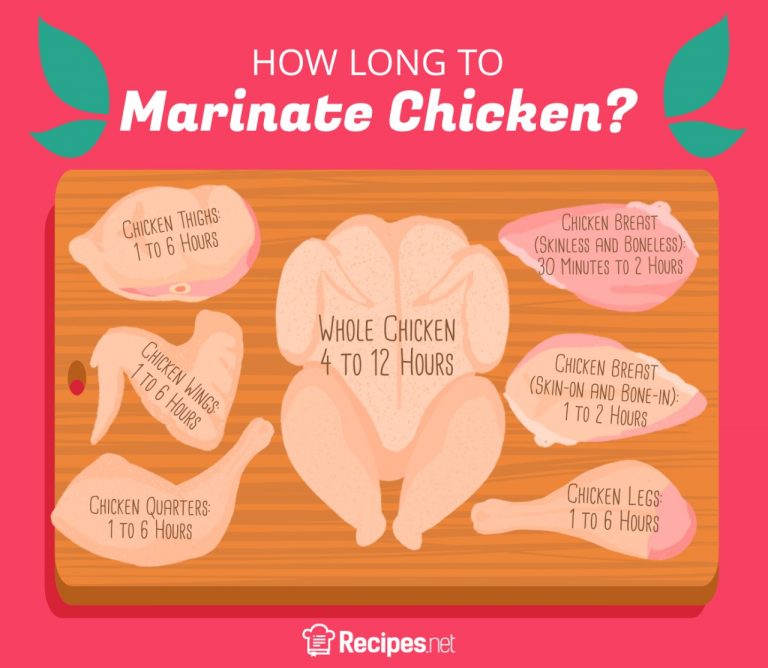
How to Make the Best Chicken Marinade
Grate: I finely grate the onion and garlic into a large bowl.
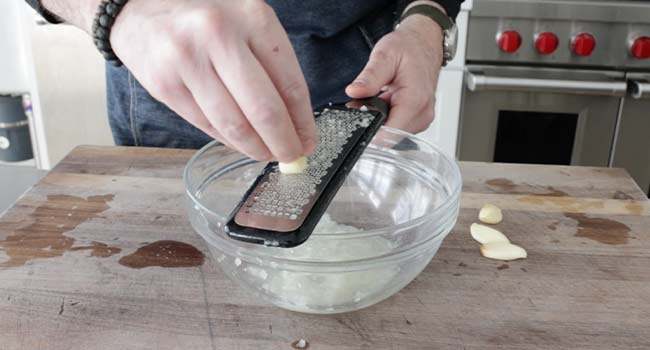
Add Lemon: Next, I squeeze in the juice of 1 lemon.
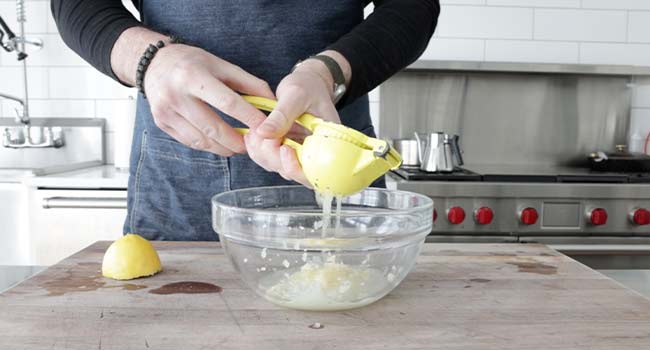
Pour: I add the soy sauce, vinegar, white wine, oil, thyme, sugar, mustard, salt, and pepper into the bowl.
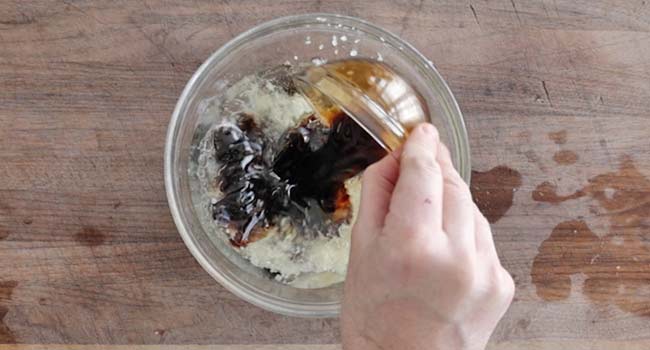
Whisk: I vigorously whisk everything together until the ingredients are fully combined and emulsified. This helps create a smooth, well-blended marinade.
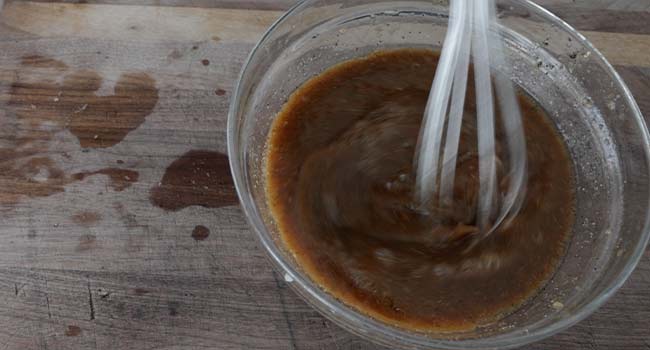
Mix: I add the chicken to the bowl with the marinade and toss it thoroughly. I make sure every piece is evenly coated for maximum flavor.
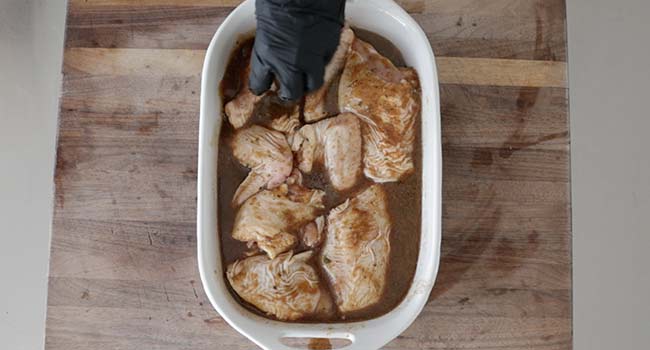
Marinate: Last, I cover the bowl with plastic wrap and place it in the refrigerator. Letting it sit for 12 to 48 hours gives the chicken time to absorb all the flavors.
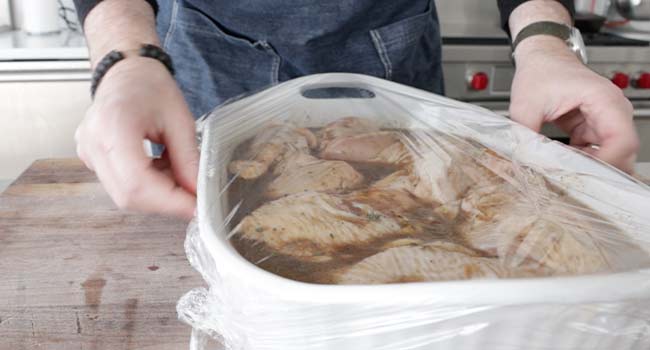
Grill: I place the chicken skin side down on a lightly oiled grill over medium-high heat, around 375° to 425°. I cook it for 10 to 12 minutes on each side until it gets dark grill marks and a temperature of 165° inside. If the heat gets too intense, I move the chicken around to prevent it from charring.
Pan-Sear: I add two tablespoons of my preferred cooking oil to a large frying pan and let it heat over medium for about a minute. Then I put the chicken on the grill with the skin side down and cook each side for 5 to 7 minutes, until the chicken is golden brown and fully cooked. I keep an eye on it because the chicken can turn brown very quickly. If it gets too dark too quickly, I turn down the heat to medium-low.
Bake: I place the chicken skin side up on a parchment-lined sheet tray and bake it at 400° for 25 to 30 minutes. I let it cook until it’s browned and fully cooked through.
